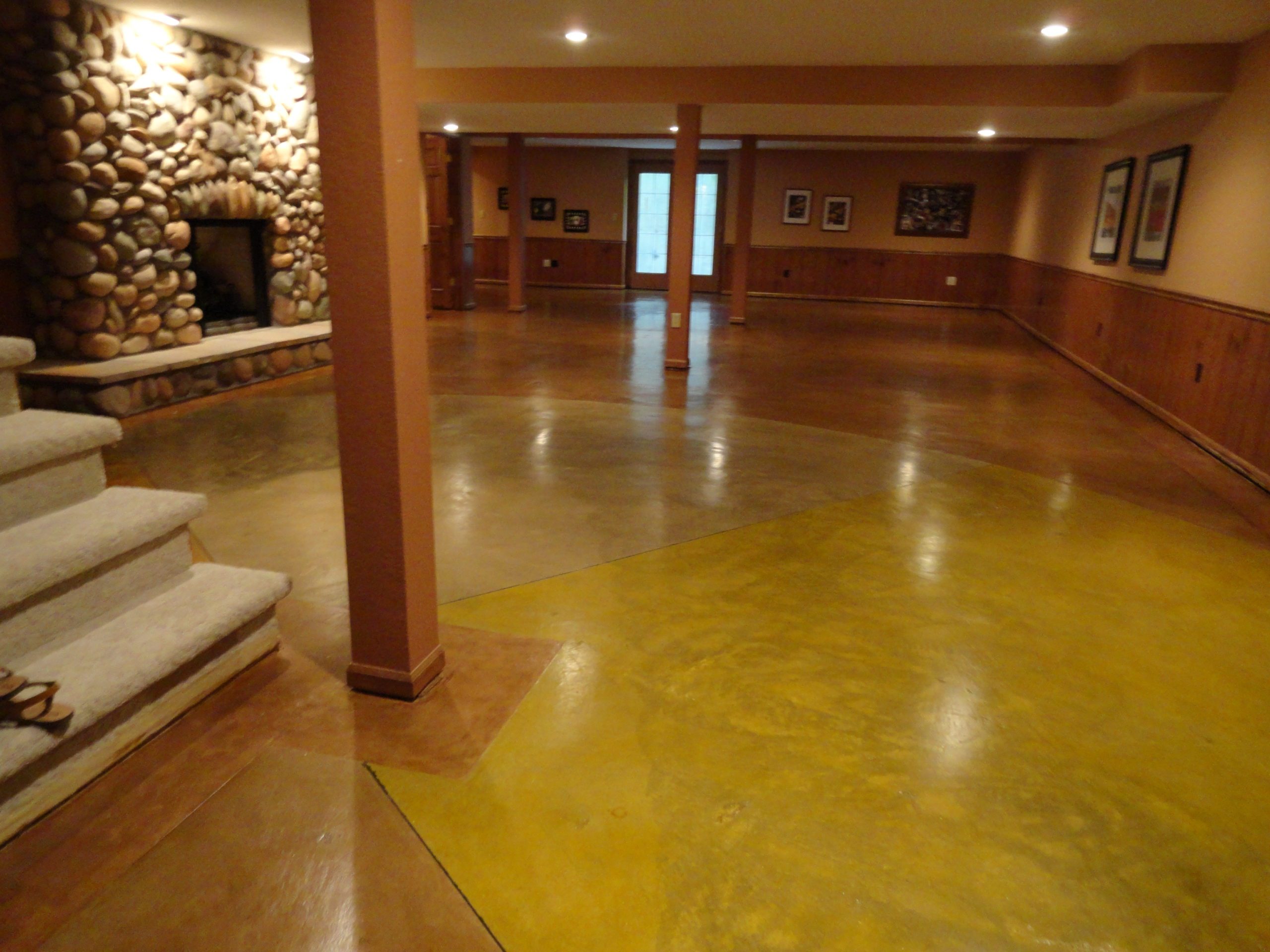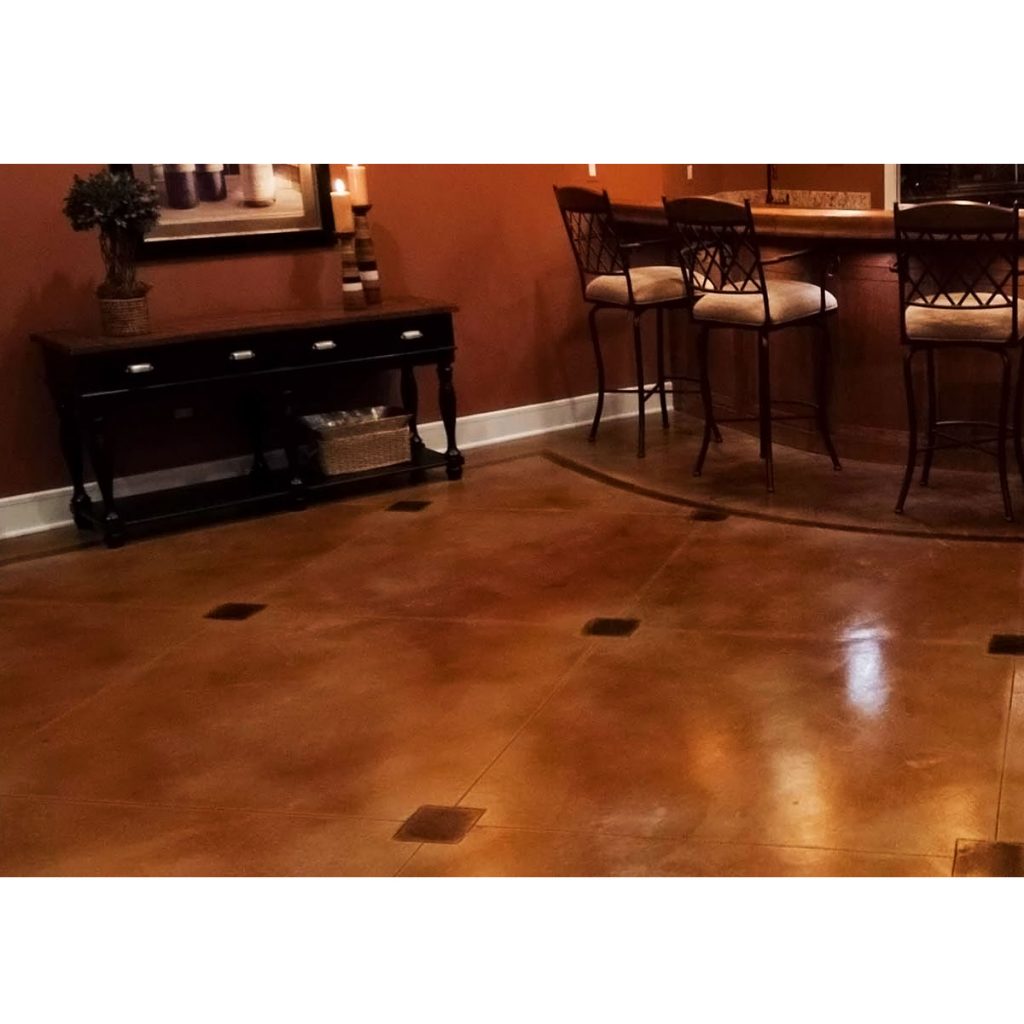How long: What to expect during a stained concrete austin project
Comprehending the Variety of Providers Offered in Flooring: Highlighting Stained Concrete Techniques
Stained concrete has actually arised as a compelling flooring option for numerous areas. Its adaptability depends on the option in between acid and water-based discolorations, each using distinctive looks. Proper preparation and continuous upkeep are necessary to assure its durability and look. As the demand for innovative flooring solutions expands, comprehending the nuances of tarnished concrete techniques can open new possibilities for both residential and industrial atmospheres. What special benefits might this flooring option offer a project?
The Essentials of Stained Concrete
Stained concrete works as a functional floor covering option that combines durability with visual appeal. This floor covering strategy includes using a specifically developed stain to the concrete surface, which passes through and alters the color of the product. The procedure not just improves the appearances of concrete however also offers the advantage of safeguarding it from wear and tear. Stained concrete can accomplish a large range of looks, from natural tones to dynamic colors, making it appropriate for different design motifs.
Proper preparation of the concrete surface is vital for suitable results. This might include cleaning, grinding, or engraving to guarantee the stain adheres properly. On top of that, the application procedure typically includes making use of tools such as sprayers or brushes to attain uniform insurance coverage. After staining, a sealant is typically applied to enhance durability and maintain the vibrancy of the color. Inevitably, tarnished concrete supplies an appealing and resilient flooring solution for residential and business areas alike.
Types of Stains: Acid vs. Water-Based

In comparison, water-based stains supply a bigger range of colors and are less complicated to use. They do not react chemically with concrete however instead offer a surface area tint - austin stained concrete service. Water-based stains are low in volatile organic substances (VOCs), making them extra ecologically pleasant and suitable for indoor projects. While they may not give the exact same deepness of color as acid stains, their versatility and simplicity of use make them appealing for different applications. Inevitably, the selection depends on the project's needs, desired visual appeals, and location
Techniques for Staining Concrete
The methods for staining concrete differ considerably in between acid and water-based techniques. Acid staining entails a chemical reaction that produces special, variegated shades, while water-based stains use a broader scheme and less complicated application. Comprehending these processes is important for accomplishing the desired aesthetic in concrete floor covering.
Acid Staining Process
Acid staining provides a vibrant means to improve the aesthetic appeal of concrete surface areas. This process includes using a mixture of water, hydrochloric acid, and pigments to the concrete, which reacts chemically to generate vibrant, translucent shades. First, the concrete surface should be extensively cleansed and prepped to assure suitable bond. Once used, the acid stain penetrates the concrete, producing distinct marbled effects as it reacts with the lime in the concrete. After the wanted shade creates, the surface area is reduced the effects of and washed to stop the response. A sealant is used to shield the surface and boost sturdiness. Acid staining not just changes the appearance of concrete but also supplies a durable remedy for decorative floor covering.
Water-Based Staining Benefits
Exactly how can water-based staining boost the aesthetic and practical top qualities of concrete surface areas? Water-based discolorations provide a functional remedy for improving concrete, providing dynamic shade options while assuring environmental security. Unlike acid spots, water-based choices penetrate the surface area, permitting for also color distribution and an array of surfaces, from matte to shiny. In addition, they are low in unpredictable organic compounds (VOCs), making them much less hazardous to interior air quality. Their fast drying out time facilitates faster task completion, while their resistance to fading makes sure durable elegance. Water-based stains can likewise enhance the concrete's sturdiness and resistance to discolorations, making them an optimal choice for both residential and commercial applications. Ultimately, they offer a lasting, appealing solution for various concrete surfaces.
Design Possibilities With Stained Concrete
Stained concrete offers a range of design possibilities that can enhance any kind of space. Strategies such as shade variant, numerous surface area ending up alternatives, and customized design patterns permit unique and tailored flooring options. These components not only elevate visual appeals yet also add to the overall capability of the concrete surface area.
Shade Variation Techniques
While discovering the style possibilities of stained concrete, shade variant techniques play a critical duty in boosting both visual charm and functionality. These techniques enable the production of one-of-a-kind patterns and results that can transform a basic concrete surface area into a visually striking element of an area. Alternatives such as acid staining, which reacts chemically with the concrete, produce rich, transparent tones that resemble all-natural stone. Water-based stains provide a broader color palette and enable for more control in style. Additionally, layering various spots can develop deepness and measurement, providing a tailored look. By integrating color variant methods, designers can accomplish diverse designs, from rustic to contemporary, ensuring that stained concrete fits flawlessly into any type of layout scheme.
Surface Area Finishing Options
The exploration of shade variation strategies establishes the stage for considering surface area completing choices, which considerably impact the overall appearance and capability of discolored concrete. Various finishes can improve the aesthetic allure and longevity of the surface area. Typical options include matte, satin, and glossy finishes, each giving a distinct visual impact. Matte surfaces supply a refined, understated sophistication, while satin finishes strike an equilibrium between luster and usefulness, making them popular for domestic and business rooms. Glossy finishes, on the other hand, develop a high-shine appearance, boosting color vibrancy and light reflection. In addition, surface treatments such as polishing or sealing even more enhance longevity, making these completing choices vital factors to consider in creating useful and aesthetically attractive stained concrete floors.
Custom-made Style Patterns
How can personalized layout patterns elevate the appeal of discolored concrete? By integrating distinct styles, discolored concrete can change normal floor covering right into a striking aesthetic declaration. Custom patterns, such as geometric forms, intricate concepts, or organic styles, enable for customization, making areas really feel tailored and welcoming. Clients can pick from a range of techniques, including saw cuts, stencils, or overlays, to accomplish desired effects. In addition, incorporating several colors with numerous stain techniques boosts the deepness and measurement of the patterns. These layout possibilities not only enhance aesthetic appeal however also increase the value of household or industrial spaces. Eventually, personalized layout patterns provide a chance for creativity, setting stained concrete besides traditional floor covering options.
Preparing Your Concrete Surface
Appropriate preparation of the concrete surface is vital for attaining a successful discolored finish. This process begins with comprehensive cleaning to get rid of dirt, grease, and any other impurities. A pressure washer or a floor scrubber can effectively eliminate these materials, making sure a fresh start for staining. After cleaning, it is vital to fix any splits or blemishes in the concrete. This can be accomplished making use of a concrete patching substance, which must be permitted to heal fully prior to proceeding.
Once the surface is tidy and repaired, grinding or fining sand might be necessary to create a smooth, even appearance. This action boosts the concrete's capacity to soak up the stain evenly. Lastly, a concrete etcher can be put on open the pores of the surface, permitting much better adhesion of the stain (austin stained concrete service). By complying with these prep work steps, the resulting discolored concrete will certainly exhibit a much more vivid and enduring coating
Upkeep and Take Care Of Stained Concrete
Keeping stained concrete is vital for preserving its appearance and longevity after the initial prep Homepage work and application of stain. Regular cleaning is vital; sweeping or vacuuming to remove dirt and particles stops scratches and dullness. For deeper cleansing, a mild pH-neutral cleaning agent combined with water can be used, adhered to by detailed rinsing to avoid deposit build-up.
Securing tarnished concrete is one more key maintenance step, as it protects the surface from spots and moisture. Depending upon the sealer type, reapplication might be required every one check here to 3 years. In addition, staying clear of rough chemicals and abrasive tools assists maintain the integrity of the stain.
For outside tarnished concrete, it is recommended to clear snow or ice quickly to protect against damage from freeze-thaw cycles. Overall, consistent treatment assurances that tarnished concrete maintains its vivid shade and structural security with time, making it a resilient floor covering choice.

Expense Considerations for Stained Concrete Flooring
When assessing the cost of stained concrete floor covering, potential home owners typically question the various factors that affect prices. Key considerations consist of the size of the location to be covered, the complexity of the style, and the sort of stain utilized. Basic staining strategies tend to be a lot more economical, while detailed patterns or numerous shades can considerably raise prices.

Geographical location is an additional element, as prices can differ commonly from one region to one more. Continuous upkeep prices must be factored in, as sealers and protective finishings may be essential over time to protect the aesthetic and sturdiness of the discolored concrete.
Regularly Asked Inquiries
Can Stained Concrete Be Applied Over Existing Floor Covering?
The inquiry of whether stained concrete can be used over existing flooring is commonly asked. Generally, it is possible, gave the underlying surface area is tidy, secure, and suitable for correct bond of the stained concrete.
Exactly how Lengthy Does the Staining Process Take?
The staining process commonly takes a few hours to a full day, depending on the size of the area and the complexity of the design. my sources Healing may need added time before the surface is completely useful.
Is Stained Concrete Suitable for Outdoor Use?
Stained concrete is without a doubt ideal for exterior use, as it endures different weather. Its toughness and aesthetic charm make it a prominent option for outdoor patios, sidewalks, and driveways, boosting both functionality and visual passion.
Can I Adjustment the Color of Stained Concrete Later On?
The ability to change the shade of discolored concrete later depends on different aspects, consisting of the original stain kind and surface area preparation. Consulting a specialist can provide assistance on possible choices and outcomes for color change.
Exist Eco-Friendly Options for Stained Concrete?
The questions regarding environmentally friendly alternatives for tarnished concrete exposes an expanding passion in sustainable structure techniques. Several business currently supply low-VOC spots and eco-friendly sealants, making certain visual charm while minimizing ecological impact.